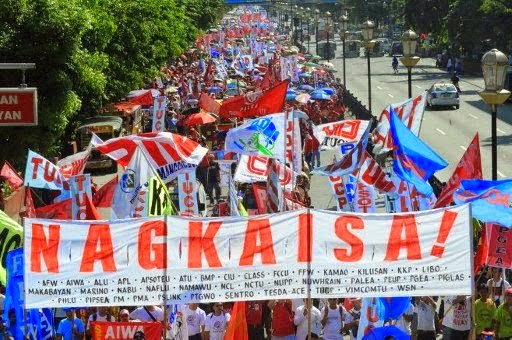 |
| File photo |
Regrettably, from the time the Constitution was ratified up to the present, the issue on living wage has never been addressed; one administration after the other deviated instead toward “wage-regionalization.” This consequently created wide gaps in wage levels all over the country.
Meanwhile, the wage-setting practice drifted toward containing the wages to the barest minimum, seeking the lowest level of balance in every region where the market clearing price of labor was primarily determined on the basis of employer’s capacity to pay rather than on the worker’s right to a living wage. The same problem exists in the public sector despite the salary standardization program.
This has created the condition for chronic poverty in the country, which has further deepened inequality as millions of workers are consigned to sustaining their families on wages that can hardly meet even half of the daily cost of living.
We, at Nagkaisa—a coalition of 47 labor federations, workers organizations in the private and public sectors, and urban and peasant groups—therefore, welcome the current administration’s plan to nationalize minimum wage, as announced recently by Labor Secretary Silvestre Bello. Indeed, there clearly is a need to rectify the deformed policy of regionalizing minimum wages.
However, a major government pronouncement remains a propaganda if left without form at the policy level. That, certainly, is what happened to the living wage principle that has lain lifeless in the Constitution for the last three decades. But with the new administration’s pledge to rectify the errors of previous administrations, Nagkaisa and the government can work together in achieving our common goal of stopping contractualization and realizing the living wage.
At this point, Nagkaisa gladly presumes that the Duterte administration remains committed to the principle of living wage and that its planned nationalization of minimum wage will ultimately lead to the realization of this goal. Workers, in the first place, deserve not a minimum wage but a fair share in the product of their labor.
Hence, encouraged by the announcement of Secretary Bello, Nagkaisa calls on Malacañang to issue an order directing all regional wage boards to set a uniform minimum wage based on the Metro Manila rate. At the same time, we call on President Duterte to certify as urgent a bill seeking the same and the repeal of the existing Wage Rationalization Act.
Nagkaisa also calls for a uniform application and implementation of the Salary Standardization Law among all local government units. Nagkaisa strongly believes in the principle of equal pay for equal work and work of equal value, not just for private sector workers but also for government employees who are in the same bind.
It is high time the Philippines ended wage-regionalization and -setting at the barest minimum. Nagkaisa believes this can be done, especially with government treating the labor movement as its main partner in this enormous reform endeavor.
—NAGKAISA (47 labor federations and workers organizations both in the private and public sectors) - By @inquirerdotnet

